
In the digital age, where search engines dominate information retrieval, academic content has its own niche ecosystem, led by Google Scholar. One of its most influential features—google scholar search—plays a significant role in measuring academic impact and visibility. But did you know that search from Google Scholar can also impact SEO and online authority?
In this comprehensive guide, we’ll explore what google scholar search are, how they work, their relevance to SEO, and how researchers, institutions, and marketers can use them to boost visibility and credibility.
What Are Google Scholar Search?
Google scholar search is a free tool by Google Scholar that allows authors to create public profiles listing their published academic works. These profiles also show:
- Total search
- h-index (a metric for productivity and citation impact)
- i10-index (number of publications with at least 10 search)
The more times a paper is cited, the higher the citation count. For academics, this is a vital indicator of scholarly influence. But for digital marketers and SEO specialists, this creates an opportunity to leverage high-authority academic backlinks and search.
Why Google Scholar Matters for SEO
Google Scholar content is indexed by Google, and often appears in the top search results—especially for long-tail keywords and research-based queries. Here’s how this ties into SEO:
1. High Domain Authority
Google Scholar (scholar.google.com) has incredibly high domain authority. If your content is referenced in scholarly publications, it builds powerful backlinks, increasing your site’s authority.
2. Link Diversity
search from different sources—including .edu, .org, and journals—provide diverse backlinks, a critical component of modern SEO strategy.
3. Topical Authority
Being cited in research increases your topical relevance for particular keywords. Search engines recognize this and may boost your content in related searches.
4. Semantic Search Benefits
Google Scholar pages are rich in semantic data—structured search, author information, publication years, etc.—which aligns with how modern search algorithms understand content.
How Google Scholar Search Work
Once an author registers and sets up a profile, Google scholar search automatically associates their name with existing publications it finds online. Each article linked to the author is then monitored for search across academic literature.
Each time another author references a work, a citation is added to that author’s profile. The more search, the stronger the authority signal both in academic and SEO contexts.
Setting Up a Google Scholar Profile (Step-by-Step)
Creating a profile is easy and essential for anyone who publishes research or wants to build academic backlinks.
✅ Step 1: Sign in to Google Scholar
Go to scholar.google.com and click on “My Profile”.
✅ Step 2: Fill In Your Details
Add your name, affiliation, email (preferably .edu or institution-based), and research areas.
✅ Step 3: Claim Your Publications
Google Scholar will suggest possible matches to your name. You can accept, remove, or add more publications manually.
✅ Step 4: Make Profile Public
Ensure your profile is publicly visible to appear in search engines and maximize SEO potential.
SEO Benefits of Google Scholar Search
Let’s dig deeper into how Scholar Search help from an SEO standpoint:
1. Backlinks from High-Quality Journals
Most academic papers are hosted on .edu, .gov, and top-tier journal websites. When your work is cited, it often links back to your original article, website, or author profile—providing a natural backlink from authoritative domains.
2. Brand Building Through Research
If you’re an SEO agency or digital consultant publishing original research, Google Scholar is a trusted platform to build personal or brand authority.
3. Referral Traffic
Highly-cited works get discovered frequently by researchers and industry professionals, creating indirect referral traffic to your site or author profile.
4. Enhanced E-E-A-T Signals
E-E-A-T (Experience, Expertise, Authoritativeness, and Trustworthiness) is a major SEO framework in Google’s search quality guidelines. Google scholar search boost all four signals—especially Expertise and Authority.
Google Scholar vs Traditional SEO Platforms
Here’s a quick comparison of Google Scholar with traditional SEO backlink strategies:
| Feature | Google Scholar | Traditional SEO |
| Domain Authority | Extremely High (.edu, .gov, .org) | Varies |
| Relevance | Academic/Niche | Broad Industry |
| Link Longevity | Very Long-term | Often Temporary |
| Cost | Free (for authors) | Usually Paid (Guest Posts, Link Building) |
| Impact | High Trust, Academic Traffic | High Volume, Commercial Traffic |
While traditional SEO focuses on content marketing, guest blogging, and link outreach, Google Scholar adds depth to your domain’s authority through research and search.
How to Get Cited in Google Scholar
If you’re not in academia but still want Google scholar search, here are strategies that work:
✅ Publish Whitepapers or Case Studies
Create downloadable PDF whitepapers, original research, or industry-specific guides. Host them on your site and distribute them to journals, newsletters, and educational platforms.
✅ Contribute to Journals
Submit guest articles, opinion pieces, or co-authored research to online academic journals or conference proceedings.
✅ Collaborate With Universities
Partner with professors or students to co-author papers. Your brand or URL may appear in search and references.
✅ Register With Academic Repositories
Submit your work to platforms like SSRN, arXiv, ResearchGate, Academia.edu, and institutional repositories.
✅ Use Structured Markup
Ensure your documents have proper citation formatting (APA, MLA), metadata, and authorship details. This helps Google Scholar index and attribute them correctly.
Bonus Tips: Optimizing Your Scholar Profile for SEO
- Use Keywords in Titles: If you’re uploading your own research, use relevant keywords naturally in the title and abstract.
- Link to Website: Add your business or portfolio website in the affiliation or bio.
- Cite Yourself Strategically: If you’re publishing multiple papers, you can cross-reference them, boosting search naturally.
- Update Regularly: Add new work, track search, and engage with academic communities.
Is Google Scholar a Legitimate SEO Strategy?
Yes, especially in niche industries like health, science, legal, engineering, and education. Google values:
- Expert sources
- Data-backed research
- Unique insights
If your content strategy includes long-form guides, reports, or thought leadership, integrating Google Scholar into your digital marketing can offer long-term SEO dividends.
What Google Scholar Search Can’t Do
Despite its value, it’s important to set realistic expectations:
- It won’t replace traditional link building.
- It doesn’t allow do-follow backlinks to your commercial site directly.
- It’s not suitable for B2C marketing.
- Not all publications are indexed, and not all search are tracked.
It’s best used as a complementary strategy—building trust and authority while your main SEO efforts drive traffic and rankings.
Case Study: SEO Agency Using Scholar Search
Let’s say you’re running an SEO agency. Here’s how you could leverage Google Scholar:
- Publish a study on link-building ROI.
- Distribute it through LinkedIn, academic communities, and email outreach.
- Submit it to marketing journals or whitepaper repositories.
- As others reference your insights in their own papers, your work starts gaining search.
- Over time, these search accumulate, leading to visibility in Google Scholar, backlinks from academic sites, and higher Google trust.
Final Thoughts: Scholar Search as an SEO Power Tool
Whether you’re an academic, digital marketer, or business owner, Google scholar search can be a powerful tool in your SEO arsenal. It enhances your online footprint, supports thought leadership, and builds authority from one of the most trusted corners of the web.
By integrating scholarly publishing with your SEO strategy, you not only get discovered in academic circles but also strengthen your search engine credibility. It’s not just about rankings—it’s about reputation, relevance, and research-driven growth.






